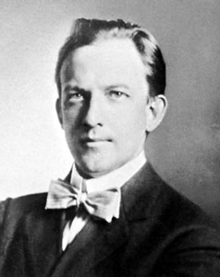Henry Hadley
| Henry Kimball Hadley | |
|---|---|
 |
|
| Background information | |
| Born |
20 December 1871 Somerville, Massachusetts, United States |
| Died | 6 September 1937 (aged 66) New York City, New York, United States |
| Genres | Classical music, opera |
| Occupation(s) | Composer, conductor |
| Instruments | Violin |
| Years active | 1893 – 1937 |
Henry Kimball Hadley (20 December 1871 – 6 September 1937) was an American composer and conductor.
Hadley was born in Somerville, Massachusetts, to a musical family. His father, from whom he received his first musical instruction in violin and piano, was a secondary school music teacher, his mother was active in church music, and his brother Arthur went on to a successful career as a professional cellist. In the Hadley home, the two brothers played string quartets with their father on viola and the composer Henry Gilbert on second violin.
Hadley also studied harmony with his father and with Stephen Emery, and, from the age of fourteen, he studied composition with the prominent American composer George Whitefield Chadwick. Under Chadwick's tutelage, Hadley composed many works, including songs, chamber music, a musical, and an orchestral overture.
In 1893, Hadley toured with the Laura Schirmer-Mapleson Opera Company as a violinist. But he left the tour when the company encountered financial difficulties and was unable to pay his salary.
In 1894, he travelled to Vienna to further his studies with Eusebius Mandyczewski. Hadley loved the artistic atmosphere of the city, where he could attend countless concerts and operas, and where he occasionlly saw Brahms in the cafes. He heard Tchaikovsky's Sixth Symphony while there, and it made a strong impact on him. During this period Hadley also befriended the German-American conductor Adolf Neuendorff, who gave him advice regarding his compositions.
He returned to the United States in 1896 and took a position as the musical instructor at St. Paul's Episcopal School for Boys in Garden City, New York, where he worked until 1902. He wrote some of his important early compositions during his time there, including his overture In Bohemia, and his first and second symphonies. He also found prominent conductors to perform them, such as Walter Damrosch, Victor Herbert, John Philip Sousa, and Anton Seidl. Hadley made his own debut as a conductor on 16 January 1900, at the Waldorf-Astoria hotel, leading a program mostly made up of his own works.
...
Wikipedia
